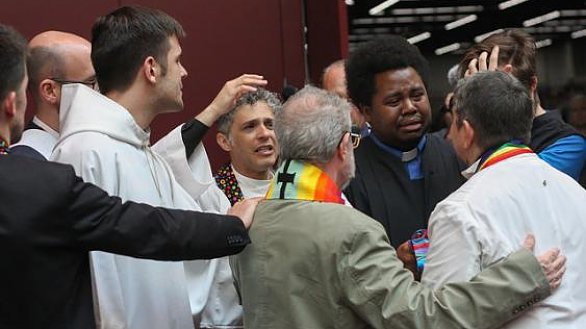Photo by Maile Bradfield, UMNS.
Activists support each other following a silent march through the May 18 plenary session of the 2016 United Methodist General Conference in Portland, Ore. They are protesting what they believe is an attempt to silence LGBTQ voices.
May 18 wrap-up: Sexuality dominates debate in unexpected ways
May 18, 2016 | PORTLAND, Ore. (UMNS) —
Last week it was debating how to debate. Today, it was voting on whether to vote. A day of tension, frustration and confusion ended in a decision to “put a pin in it.” Delegates to General Conference 2016 spent most of the day deciding whether to move forward on dozens of petitions regarding the denomination’s stance on human sexuality, or whether to refer that difficult subject to a special commission to be appointed by the Council of Bishops. They referred.
Now the newly created body will study every paragraph in the Book of Discipline related to human sexuality and possibly recommend revisions. General Conference 2018, anyone?
GC2016 puts hold on sexuality debate
General Conference delegates apparently have hit the pause button on the denomination's quadrennial debates related to homosexuality.
Late afternoon May 18, the delegates voted to accept the recommendation of the Council of Bishops to delay a debate on homosexuality at this gathering of the denomination’s top legislative assembly and let a proposed commission study church regulations.
“We accept our role as spiritual leaders to lead The United Methodist Church in a ‘pause for prayer’ — to step back from attempts at legislative solutions and to intentionally seek God's will for the future,” said Council of Bishops president Bishop Bruce Ough in announcing the recommendation.
The bishops also suggested they might call a special General Conference in 2018 or 2019 to deal with such proposals, Ough said.
Opening worship
“If you are going to go, there is a shadow figure that follows you also. You need to know that while you go, evil is going also,” Mississippi Episcopal Area Bishop James Swanson Sr. told delegates to General Conference 2016 in his sermon during May 18 opening worship.
Swanson preached on the passage of Matthew 12:43-45 about an unclean spirit wandering through the dry places in search of a place to rest, then returning home and bringing seven other evil spirits with it.
“Evil is not content to be by itself. Evil loves to party and you can’t party by yourself, so evil runs in a pack,” he said. “When evil finds a home that is hospitable, evil goes and gets its crew.”
GC2016 recalls, laments Sand Creek Massacre
Concerns about legislation got set aside as delegates focused instead on a historic tragedy with deep Methodist involvement. The 1864 Sand Creek Massacre was the subject, and speakers included a historian and descendants of the Cheyenne and Arapaho Indian survivors of the attack.
Mountain Sky Area Bishop Elaine J.W. Stanovsky had joined the descendants in planning the event, the latest effort yet by The United Methodist Church to atone for the Sand Creek Massacre.
“We’re here to listen and to tell the truth,” Stanovsky told delegates.
“We now extend our hand in friendship to the Methodist Church,” said William Walks Along, a Northern Cheyenne descendent of massacre survivors. “We have developed a measure of trust, respect and honor for each other.”
Judicial Council: Mandatory penalties unconstitutional
Imposing a mandatory penalty during the “just resolution” process for a clergyperson admitting to committing a chargeable offense is unconstitutional, The United Methodist Church’s top court has ruled. A just resolution “can be an alternative way of handling chargeable offenses,” but the call “for a specific penalty in creating a just resolution is also unconstitutional as it denies the clergyperson the specific right to trial and appeal,” the council’s decision stated.
Some in the church have been unhappy with just resolutions for clergy who have performed same-gender marriage ceremonies, stating that such a resolution is too lenient for what they view as a violation of the United Methodist clergy covenant.
Imagine No Malaria celebration rocks the house
General Conference 2016 ended its first morning session celebrating the Imagine No Malaria initiative launched in 2008 and learned of the next phase: Abundant Health. The Abundant Health program seeks to engage at least 10,000 U.S. churches in programs that encourage promoting physical activities, healthy diet and nutrition, education for tobacco- and drug-free living and mental health education.
The 12-minute celebration debuted “Able,” a song commissioned by Imagine No Malaria as a gift to United Methodists across the globe. Jeremy Rosado, a Top 12 contestant on “American Idol,” performed the song for more than 1,000 people attending the event.
“What began with the bite of a mosquito has transformed into a faith-driven global health movement,” said Bishop Thomas Bickerton, Imagine No Malaria chair. “Together, we have Imagined No Malaria. Now let us imagine Abundant Health.”
In other news
United Methodists celebrated new relationships with the Moravian Church and the Uniting Church in Sweden as they marked Ecumenical Day on May 17 at General Conference 2016. United Methodists have approved a “full communion” agreement with the northern and southern provinces of the Moravian Church in North America that recognizes each other’s ministries and encourages witness and mission work together.
The U.S. United Methodist Church is still not a central conference. Though a petition to make it so was defeated in committee, a group of delegates brought it back to floor debate under Rule of Order 34(3). A motion to defer the decision to the newly created special commission appointed by the Council of Bishops was defeated and the session ended before the main petition could be voted upon.
Delegates paused their deliberations of petitions for presentations honoring the work of the Global AIDS Fund, the United Methodist Board of Pensions and Health Benefits and Vital Congregations, as well as acknowledging the 30th anniversary of DISCIPLE Bible Study.
Butler is a multimedia editor/producer for United Methodist Communications. Contact him atnewsdesk@umcom.org or 615-742-5470.


